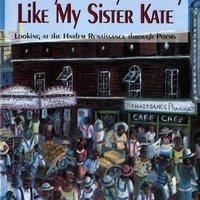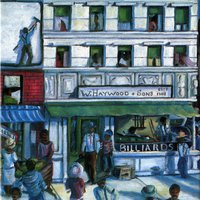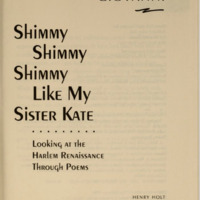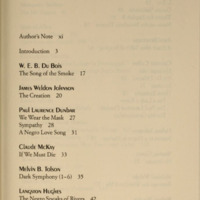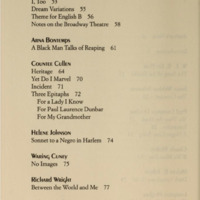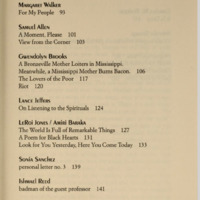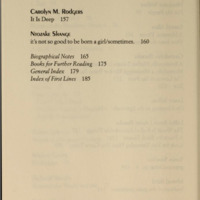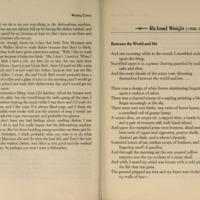Shimmy Shimmy Shimmy Like My Sister Kate: Looking at the Harlem Renaissance through Poems
Item
-
Title
-
Shimmy Shimmy Shimmy Like My Sister Kate: Looking at the Harlem Renaissance through Poems
-
This edition
-
"Shimmy Shimmy Shimmy Like My Sister Kate: Looking at the Harlem Renaissance through Poems." Ed. Nikki Giovanni. New York: Holt, 1996. xii+186 pp.
-
Table of contents
-
● Author's Note
● Introduction
● W.E.B. Du Bois / The Song of the Smoke
● James Weldon Johnson / The Creation
● Paul Laurence Dunbar / We Wear the Mask
● Paul Laurence Dunbar / Sympathy
● Paul Laurence Dunbar / A Negro Love Song
● Claude McKay / If We Must Die
● Melvin B. Tolson / Dark Symphony (1-6)
● Langston Hughes / The Negro Speaks of Rivers
● Langston Hughes / Dinner Guest: Me
● Langston Hughes / Harlem
● Langston Hughes / Dream Boogie
● Langston Hughes / Dream Boogie: Variation
● Langston Hughes / Same in Blues
● Langston Hughes / I, Too
● Langston Hughes / Dream Variations
● Langston Hughes / Theme for English B
● Langston Hughes / Notes on the Broadway Theatre
● Arna Bontemps / A Black Man Talks of Reaping
● Countee Cullen / Heritage
● Countee Cullen / Yet Do I Marvel
● Countee Cullen / Incident
● Countee Cullen / Three Epitaphs: For a Lady I Know; For Paul Laurence Dunbar; For My Grandmother
● Helene Johnson / Sonnet to a Negro in Harlem
● Waring Cuney / No Images
● Richard Wright / Between the World and Me
● Robert Hayden / Frederick Douglass
● Robert Hayden / Those Winter Sundays
● Robert Hayden / The Whipping
● Robert Hayden / Runagate Runagate
● Margaret Walker / For My People
● Samuel Allen / A Moment, Please
● Samuel Allen / View from the Corner
● Gwendolyn Brooks / A Bronzeville Mother Loiters in Mississippi
● Gwendolyn Brooks / Meanwhile, a Mississippi Mother Burns Bacon
● Gwendolyn Brooks / The Lovers of the Poor
● Gwendolyn Brooks / Riot
● Lance Jeffers / On Listening to the Spirituals
● LeRoi Jones (Amiri Baraka) / The World is Full of Remarkable Things
● LeRoi Jones (Amiri Baraka) / A Poem for Black Hearts
● LeRoi Jones (Amiri Baraka) / Look for You Yesterday, Here You Come Today
● Sonia Sanchez / personal letter no. 3
● Ishmael Reed / badman of the guest professor
● James Randall, Jr. / When Something Happens
● Nikki Giovanni / a poem (for langston hughes)
● Nikki Giovanni / Nikki-Rosa
● Carolyn M. Rodgers / It Is Deep
● Ntozake Shange / it's not so good to be born a girl/sometimes.
Biographical Notes
Books for Further Reading
General Index
Index of First Lines
-
Anthology editor(s)' discourse
-
● In her introduction, Nikki Giovanni writes that the Harlem Renaissance came about because "Black people were tired of being portrayed. They were sick of mammies and 'Birth of a Nation'" (6). "The Renaissance came in the arts, but it was the result of new social conditions. In the early twentieth century blacks came up north in great numbers. In 1890, only one out of every seventy persons in Manhattan was black. By 1930, it was one in nine" (6).
● "I called this book 'Shimmy Shimmy Shimmy Like My Sister Kate' because ordinary people, black people--if they didn't do anything else--ordinary people took up the new spirit in terms of creating themselves through dance" (6): "The shimmy wasn't just the dance, it wasn't 'Shimmy, Shimmy,' it was the freedom of your own body. You owned it and you could celebrate it. You could rejoice with it" (7).
● "The Renaissance was a great flowering. It was a people deciding that we will wage war with images. We will wage war with creativity, with words, with our souls. We will not stoop to be what you think we are, nor will we stoop to be what you are trying to make us. We are going, in the words of the old spiritual, 'to plant our feet on higher ground.' That's what is outstanding about this period, and I think that's why I wanted to link from the beginning, from the back all the way up front, because it's still affecting us" (14).
-
Reviews and notices of anthology
-
● "Kirkus Reviews" (1 April 1996): each of the 23 chapters begins with a poem or poems by a different poet, followed by Nikki Giovanni's discussion of "the lives of these writers, the context of African-American history, and the structure and sense of the poems in short chapters. The book is a conversation--readers can almost hear Giovanni talking--as she anticipates questions, clarifies obscurities, and utterly beguiles with her passion and personal feelings for the writers."
-
Cited in
-
• Indexed in "The Columbia Granger's Index to African-American Poetry" (1999)
-
Item Number
-
A0505
 I Am the Darker Brother: An Anthology of Modern Poems by Negro Americans
I Am the Darker Brother: An Anthology of Modern Poems by Negro Americans
 Poetry of Black America: Anthology of the 20th Century
Poetry of Black America: Anthology of the 20th Century
 Classic Fiction of the Harlem Renaissance
Classic Fiction of the Harlem Renaissance
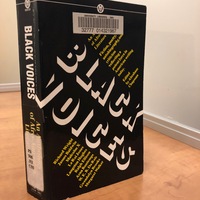 Black Voices: An Anthology of Afro-American Literature
Black Voices: An Anthology of Afro-American Literature
 New Black Voices: An Anthology of Contemporary Afro-American Literature
New Black Voices: An Anthology of Contemporary Afro-American Literature
 Voices from the Harlem Renaissance
Voices from the Harlem Renaissance
 Book of American Negro Poetry
Book of American Negro Poetry
 Portable Harlem Renaissance Reader
Portable Harlem Renaissance Reader
 In Search of Color Everywhere: A Collection of African-American Poetry
In Search of Color Everywhere: A Collection of African-American Poetry
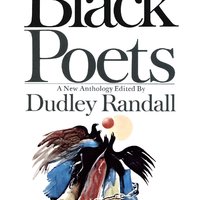 Black Poets
Black Poets








